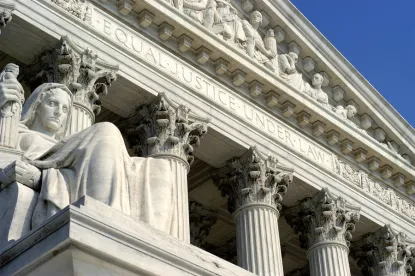The death of Supreme Court Justice Ruth Bader Ginsburg, and alongside it the high probability of a conservative successor to the open seat she left behind, is likely to shift the Court substantially to the right. Among the most notable cases that will likely be presented before the newly constituted Court is the pending challenge to the Affordable Care Act (the “ACA”).
We have previously examined the case history of Texas v. the United States (the “Case”), from the initial district court opinion, to its appeal to the Fifth Circuit, the Department of Justice’s brief in support of eliminating the ACA through this case, and the final decision from the Fifth Circuit, which can be seen here and here.
With Justice Ginsburg on the Court, stakeholders anticipated that the ACA would likely survive. While there was a conservative majority on the Court, consisting of Chief Justice Roberts, and Justices Alito, Gorsuch, Thomas and Kavanaugh, Chief Justice Roberts has consistently come to the ACA’s rescue. With Justice Ginsburg gone, the outlook seems a bit different.
By way of background, under the District Court ruling the judge determined that the ACA’s individual mandate, which was reduced to $0 as a result of the Tax Cuts and Jobs Act of 2017, was no longer considered a tax – meaning Congress no longer had the authority to enforce it. The District Court then held the individual mandate inseverable from the ACA, such that the whole law was unconstitutional. In a controversial turn of events, the Fifth Circuit, while upholding the unenforceability of the individual mandate, remanded the case back to the same District Court judge without ruling on the severability of the mandate. Now the time has come for the Supreme Court to take up the question of the ACA’s continuing viability.
Currently, the Supreme Court is set to hear arguments for the Case after elections, on November 10th. There are a few scenarios that may play out here. First, if no replacement is sworn in by that time to hear this case, there is a chance that one of the conservative justices, most likely Chief Justice Roberts, joins the liberals in their support of the ACA – resulting in a 4-4 deadlock that keeps the Fifth Circuit’s decision as is. There is a chance that the law will then continue on through the judicial process and eventually make its way back up to the Supreme Court. On the other hand, if the conservative justices band together on their decision, or if a conservative justice is appointed by then, it could very well be the end of the ACA as we know it. There’s a third option – Justice Kavanaugh has previously privately indicated that he may not support the argument that the mandate is inseverable, suggesting that holding one piece of the ACA invalid may not invalidate the ACA in its entirety. A chance remains that more than one conservative will break ranks and prevent the entirety of the ACA from being held unconstitutional. The most likely outcome, however, appears that the Fifth Circuit decision will be upheld in a 5-4 decision, with Justice Roberts siding with the Court’s liberal wing against a 5 Justice conservative majority.
Top Contenders
Of course, the outcome also depends on the potential new conservative pick’s view on the ACA and particularly whether the nominee falls more in the Justice Roberts camp or aligns more fully with Court’s more conservative majority.
A top contender is Judge Amy Coney Barett, who has been particularly vocal in her criticisms of elements of the ACA. For one, she has previously signed a petition against the ACA’s mandate for employers to provide birth control access through their insurance plans, arguing it infringed on religious freedom. For another, she has previously written an article against the 2012 Supreme Court ruling that upheld the ability for Congress to enforce the requirement that Americans obtain health insurance or then face the tax penalty. Her rationale was that this was not a tax, and thus the statute should have been invalidated as it fell outside of Congress’ power to enforce. In this article, she was particularly critical of Chief Justice Roberts and what she noted as a “deference to democratic majorities.” Given Judge Barett’s history in speaking out against the ACA, and in particular against Chief Justice Roberts’ decisions in this arena, as well her previous willingness to see the ACA invalidated as a whole, it seems particularly likely that if chosen she will vote to uphold the Fifth Circuit’s decision.
Barbara Lagoa, another candidate at the top of the list, has been far less vocal about her stance on the ACA. However, she has previously referred to Roe v. Wade as “settled law” and “binding precedent of the Supreme Court.” Given this precedent, there’s a chance she may be more likely to break ranks with the conservative majority. Moreover, she was confirmed by the Senate in a bipartisan vote with a far less narrow margin than Judge Barett, making her an attractive choice to put forward.
Other Options?
On the other hand, if Vice President Biden wins the election in November and Democrats are able to take control of both houses of Congress, he would be able to simply replace the ACA with a new law that meets the legal challenges the ACA is currently facing (although to achieve this objective in the Senate, the budget reconciliation process would likely need to be utilized or, in the alternative, the filibuster eliminated, which would be a highly controversial move). If this were to happen, the new law could be more extensive than the ACA in its current form (e.g., by including a public option).
The idea of eliminating the filibuster in the Senate and expanding the size of the Supreme Court has been a subject of recent discussion in Democratic circles, and if such were to occur it would be reasonable to assume that President Biden and a Democratic Senate would likely fill the newly created seats with Justices sympathetic to the ACA and other Democratic causes. However, this outcome seems unlikely given the current political environment and various on-the-record statements of stakeholders who would have to drive this process.
The Future
As we have speculated in prior analyses of the Case, the impact of the ACA’s repeal or invalidation would be sure to be great. Not only would there be a massive loss in coverage by tens of millions of Americans, but absent a legislative fix, the ACA’s protections for those with pre-existing conditions would could find insurance difficult or impossible to procure,and children between the ages of 18 – 26 would no longer be able to remain on their parents insurance. We will monitor and provide updates as they come.





 />i
/>i
